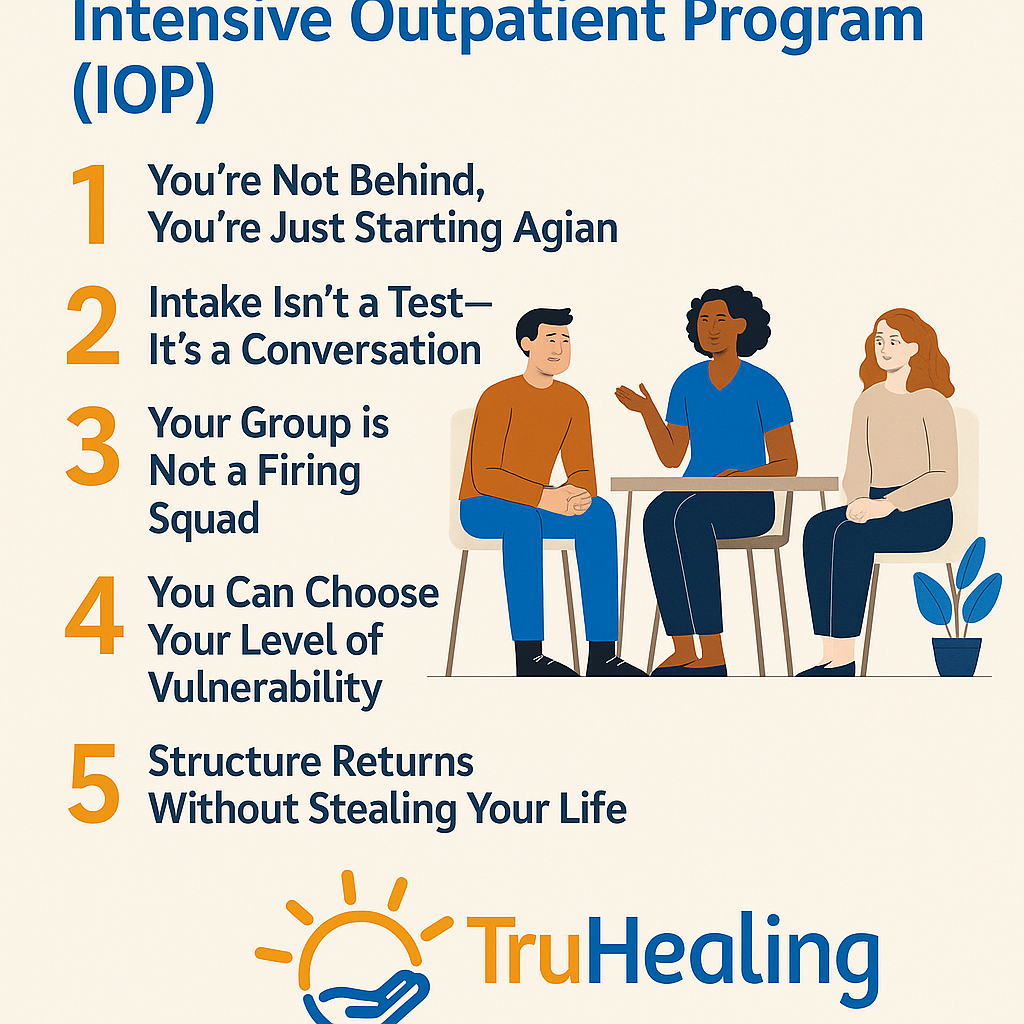Starting IOP can feel like re-entering a room you once quietly slipped out of. Maybe you’re not even sure if the door is still open—or if you’ll be judged for walking back through it. Here’s the truth: your seat is still there. And if it helps, many people in the room have done the same thing.
If you’re wondering what the first week of IOP is really like—especially if you’re coming back after a break—this guide is for you. No pressure. No shame. Just a realistic, hope-filled look at what actually happens.
You’re Not Behind, You’re Just Starting Again
It’s common to think you’ve “blown your chance” if you left treatment early or ghosted after intake. But recovery isn’t a one-and-done process—it’s a cycle. At TruHealing Cincinnati, we see people return after weeks, months, even years. And when they do, we don’t ask, “Why did you leave?” We ask, “What do you need now?”
Treatment isn’t a test you fail. It’s a space you return to when you’re ready—or just ready enough.
Intake Isn’t a Test—It’s a Conversation
The first step in any IOP program is the intake process. If you’ve done it before, you might remember it as overwhelming. This time, it might feel different.
Intake typically includes:
- A one-on-one conversation with a clinician
- Questions about your current use, mental health, and support needs
- Some paperwork and consent forms
- A basic plan for what your schedule will look like
But here’s what it’s not: a place to justify your past, explain your disappearance, or prove you’re ready. You don’t have to impress anyone. You just have to be honest enough to start.
Your Group is Not a Firing Squad
One of the biggest fears about starting—or restarting—IOP is the group therapy component. Many people imagine a room full of strangers staring them down, waiting to hear a confession. That’s not what happens.
In reality, group therapy is:
- Led by a trained facilitator (usually a therapist or counselor)
- Grounded in respect and confidentiality
- Focused on shared tools, themes, and check-ins
- A mix of participation—some talk more, some listen more
Your first few sessions might feel weird. You may feel awkward, unsure if you belong, or even tempted to leave early. That’s normal. Just showing up is enough. You don’t have to speak if you’re not ready.
“I came back after missing two weeks. I thought they’d be mad. They just scooted over and said, ‘Glad you’re here today.’ That meant everything.”
– IOP Client, 2023
You Can Choose Your Level of Vulnerability
Contrary to the myths, IOP isn’t about oversharing. You don’t have to pour out your entire life story in week one. In fact, many people spend the first week simply listening, observing, and deciding when it feels safe to open up.
What’s expected of you:
- Respect for others
- Willingness to try
- Showing up consistently
What’s not expected:
- A perfect attendance record
- Deep emotional availability right away
- Explaining your past in detail
IOP is designed to meet you where you are—not where you think you “should” be.

Structure Returns Without Stealing Your Life
One of the key features of an intensive outpatient program is that it allows you to live at home and maintain aspects of your routine—while still receiving consistent support. In your first week, you’ll get a clearer picture of how that rhythm works.
You’ll typically:
- Attend 3–5 group sessions each week
- Have scheduled individual therapy (weekly or biweekly)
- Work on recovery assignments or goal planning between sessions
Many clients say the return to structure feels like a relief—especially after a period of chaos or emotional numbness. But unlike residential treatment, you’ll still sleep in your own bed, eat dinner with your family, and manage your real-world responsibilities.
You Might Feel Worse Before You Feel Better
This one’s important: starting IOP can stir up feelings. That’s not a sign of failure—it’s a sign that something is starting to thaw.
You might feel:
- Raw or emotionally exposed
- Self-conscious around others
- Angry, sad, or numb
- Hopeful—and then afraid of that hope
These reactions are normal. In fact, they’re part of the healing process. IOP gives you space to work through these feelings without needing to fix them all at once.
It’s Okay to Come Back After Leaving
If you’ve left IOP before—or if you never showed after intake—you might worry the door is closed. At TruHealing Cincinnati, it’s not.
We understand that life happens:
- Maybe you got overwhelmed and backed out
- Maybe you relapsed and felt ashamed
- Maybe you just weren’t ready
If you’re local to Lexington, Kentucky or Springfield, Ohio, TruHealing offers help that meets you exactly where you are. Whatever the reason, we don’t keep score. Your first week back is still your first week. You’re still welcome here.
FAQ: Common Questions About Starting (or Restarting) IOP
What if I already dropped out once—can I still come back?
Yes. Many clients return after time away. We view returning to IOP as a strength, not a failure.
Will I have to start over completely?
Not necessarily. Your treatment team will meet you where you are. Some things may carry over; others may begin fresh. It’s all based on your current needs.
Do I have to talk in group during the first week?
No. Participation is encouraged, but you can listen until you feel safe. Many people ease into speaking over time.
Can I work or go to school while doing IOP?
Yes. That’s part of what makes outpatient programs work for many people. We’ll help you design a schedule that fits your life.
What if I feel worse after I start?
That’s common. Healing can bring up hard emotions at first. Your support team is here to help you move through—not get stuck in—those feelings.
This Week Doesn’t Have to Be Perfect. It Just Has to Begin.
Whether it’s your first time in IOP—or the second, third, or tenth—what matters is that you’re willing to take the next step. There’s no punishment for starting again. Only support.
You don’t have to be ready. You just have to be here.
📞 Want to talk about starting—or restarting—treatment?
Call (888) 643-9118 or visit our intensive outpatient program in Cincinnati, Ohio to learn more about how we can support you today.


